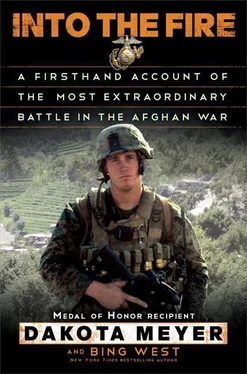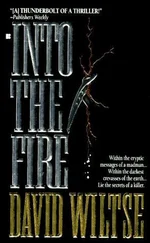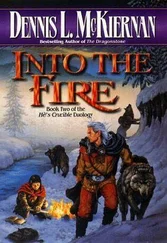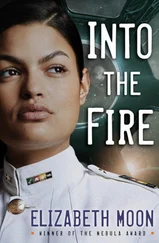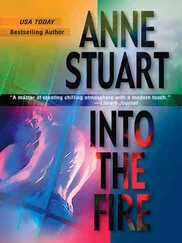When asked to describe my nature, Big Mike likes to tell the story of the ATV. Big Mike kept his all-terrain vehicle in the shed next to the house. Consisting of a motor, a seat, and three or four wheels, the ATV is the twentieth-century horse on farms across America. It goes anywhere on a few gallons of gasoline and you don’t have to shovel out the stable afterward. It can speed across fields, splash through creeks, and claw up hillsides. Without the ATV, life on a farm would be pure drudgery.
As a four-year-old, I was obsessed with it. I’d perch on the seat for hours, begging Dad to take me for one more ride. Finally, he decided to teach me a lesson.
“Ko,” he said, which was my nickname, “I have work to do. No more rides. When you’re big enough to start the machine yourself, you can drive it yourself.”
Since you had to kick-start it like a balky motorcycle, Dad thought it would be a year or more before I could do that. He’d sit on the stoop after work, smiling as I pushed my little legs down, time and again. This went on for weeks. The angrier I got, the more I tried. The thing would not budge. We are both pretty stubborn.
Big Mike was in the kitchen when he finally heard chug-chug and rushed outside to see me smiling brightly. I’d figured out how to climb up on the seat and jump down on the kick lever with all forty pounds of me until that damn ATV started. So he let me take it for a spin.
When I was eight, Dad brought me to his favorite tree stand on a cool October morning before dawn. He was brushing leaves away to climb up into the stand when a deer walked into the open behind him, not fifty feet from us.
“Dad,” I whispered, “there’s a deer.”
He squinted over his shoulder in the thin light.
“If it has horns,” he whispered, “shoot it.”
I let go with a shotgun. The deer leaped straight up in the air and crashed down on its side without quivering. I had killed an eight-point buck.
When we butchered the carcass, I was so excited that the warm guts and the heavy smell of the blood didn’t bother me. In the years after that, hitting moving animals and birds gradually became second nature. Cutting up fresh kills, ugly as that sounds, accustomed me to what I would encounter a decade later on the battlefield.
I had been in grammar school only a few years when my mother called Big Mike to say it seemed best if I stayed with him permanently. One short phone call and my life had changed for the better.
When I was eleven, my school held a contest for the best public speaker in each grade, and Big Mike encouraged me to enter.
I wrote down what I wanted to say, and Dad and I practiced my lines at least ten times a day.
“Slow down when you speak,” he said. “Think about your main message and say it clearly.”
Each speaker had three minutes. When it was my turn, I talked about Tinker Bell, the Cowboy Cow. We had no horses on our farm, so I picked out this big old cow and petted and talked to her every evening. When she learned to come to my voice, I rewarded her with peaches and Dr Pepper. Eventually, I was riding her to herd the other cows and lasso them. I concluded my speech by declaring that Tinker Bell and I could win any cow race in the county, maybe in the whole state.
My little speech won first prize for the sixth grade. From that tiny victory, I developed a confidence in speaking up that would later exasperate Marine sergeants (and cause me some grief on occasion).
* * *
Each year, Dad gave me responsibility for ever more serious chores. When I was in the seventh grade, Grandfather Dwight—Dad’s dad—came by one fall day while I was driving the big tractor, spiking balls of hay. This meant I was constantly shifting in the seat to look down at the steel forks and keep them aligned. Grandfather Dwight lit into me with his booming voice. He thought I’d tip over the tractor and be crushed.
When Dad got home an hour later, one glance told him what was going on with the tractor and me and Grandpa. I was trembling and shaky. Dad put his arm around me and looked at his father.
“He knows what he’s doing,” he said. “Ko, you go finish moving in hay.”
When I was in the eighth grade, we were still growing tobacco on our farm. In summer, when the broad leaves on the tobacco plants reached as tall as a man, you’d hack off the stem and thrust a wooden pole through the leaf. When you’d speared ten stalks—twenty or more pounds—you’d stack the load in the patch for a few days, or toss it onto a trailer to take and hang in the barn.
Mexican itinerant workers came to do the cutting. The pay was ten cents a spear. I asked Dad to hire me. I would work for an hour and then collapse for two. The Mexican workers stayed in the fields ten hours a day, hoisting sixty spears an hour. They were the hardest-working men I’ve ever seen.
You could wear long-sleeved clothes, gloves, and a mask or kerchief to protect yourself while cutting. I chose not to, so all that tobacco would rub in through my sweat. After work, I’d vomit until I had retched out the nicotine poison. One night I couldn’t stop throwing up and Dad rushed me to the hospital. Even after they pumped fluids into me, I was so dehydrated I couldn’t pee. The nurses were about to put in a urinary catheter when my dad, laughing at my expression, persuaded them not to. Most small farmers quit raising tobacco after the legal settlements in the late ‘90s. I often wondered what became of those tough, cheerful Mexican workers.
I did all right in school, especially in math. Dad did not let up on me. When I left the laundry half done one day—I had stayed out too late and, for once, got home after he did—he had tossed the laundry out onto the lawn so I could start over and do it right.
But he didn’t do stuff like that often because he didn’t need to—I was listening and learning.
Grandfather Dwight helped me with math and geometry as I went further in school. Being an engineer, he showed me that a formula is just like a little machine you needed to figure out.
“It’s all simple logic, once you can see it right,” he told me. “If you put it together right, it runs. If you don’t, it won’t.” I liked the fact that math was black and white, yes or no, right or wrong, with no bullshit gray zones.
In high school sports, I wanted to be a running back. I was too big to dodge around quickly, though I could smash into the opponents just fine. To improve my agility, I put bales of hay out in the fields and practiced dodging through them.
Coach Mike Griffiths became a third father figure for me. By my sophomore year, I was the starting back in junior varsity. For me, football was a game of high-speed chess—you are looking for holes, thinking a few moves ahead, exploiting weaknesses, and looking for cover. You are zigzagging into the fight or out of it toward the goal.
I dated girls and enjoyed high school life—I tended toward tiny brunettes—but my life was mostly a gladiator school of, by, and for three demanding men—four including myself.
All that testosterone made me a little rough around the edges. I tried to have some sensitivity around sensitive people, but generally, I would rather have punched a guy and gotten punched back. I have a sweet cousin, Jennie, who is my age. We were in the same high school and I said something to her that was a little mean. It wouldn’t have been anything if I had said it to her in our own backyard, as she would have just given me a face and thrown something at me. But around her friends, it came off differently. She went home upset.
Her dad, Uncle Mark, drove her over to our house and asked me to look at how upset she was—“Ko, if you don’t stand up for your family, you’ll never have anything worthwhile in life,” he said. Dad was there, too, arms crossed, nodding his agreement. I apologized to her and decided I would have to work on that side of my brain. I would get sensitive.
Читать дальше
